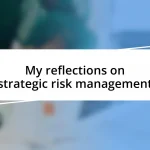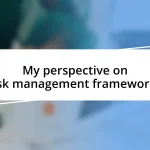Key takeaways:
- Angel investing is an emotional journey that combines excitement, uncertainty, and the importance of building personal connections with entrepreneurs.
- Key benefits of angel investing include potential high returns, networking opportunities, personal fulfillment, and the ability to influence business decisions.
- Success in angel investing requires patience, emotional intelligence, and a willingness to learn from both successes and failures.

Understanding angel investing journey
The angel investing journey often feels like a roller coaster ride, filled with thrills and unexpected turns. I still remember my first investment; it was both exhilarating and nerve-wracking. I believed in the entrepreneur’s vision, but doubts crept in—what if the idea didn’t take off?
As I navigated this path, I realized that each investment taught me something new. There’s always a blend of hope and apprehension; you invest not just money but also your trust in someone’s dream. Have you ever felt that rush of optimism mixed with anxiety? It’s a heady mix that keeps you engaged and aware of each step you take.
Building relationships with entrepreneurs is one of the most rewarding parts of this journey. I often find myself rooting for their success, as if their triumphs reflect my own. It’s amazing how personal these connections become—each pitch, each update, pulls at your heartstrings in a way that just numbers can’t capture. Isn’t it fascinating how investing can create a tapestry of shared dreams and aspirations?
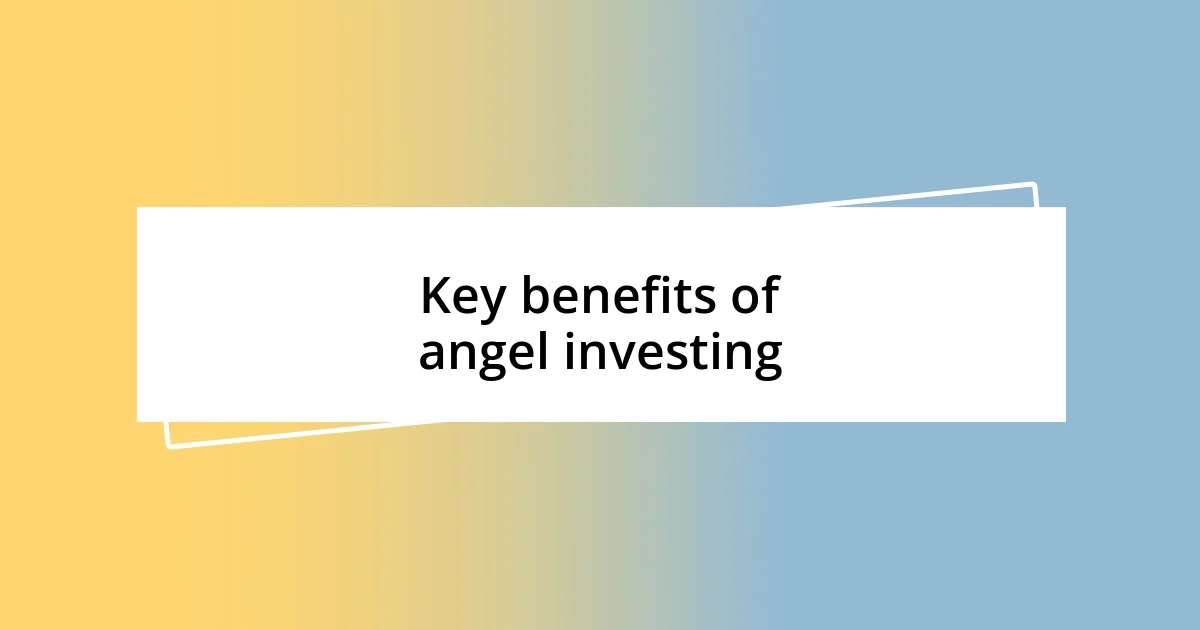
Key benefits of angel investing
Angel investing opens doors to unique opportunities that can transform not only businesses but also the investor’s personal journey. One of the standout benefits for me has been the intimate connection I get with the founders. When I invested in a tech startup, I felt like I was part of their team. I didn’t just offer funds; I provided mentorship, bouncing ideas back and forth. This collaboration was invaluable, making the success of the startup feel like a shared victory.
Here are some key benefits of angel investing:
- High Return Potential: Investing in early-stage companies can yield substantial returns if the business thrives.
- Networking Opportunities: Angel investing helps to build a diverse network of entrepreneurs, innovators, and fellow investors.
- Personal Fulfillment: Supporting passionate founders often leads to a profound sense of accomplishment and purpose.
- Learning Experience: Each investment offers a chance to understand different industries and refine one’s investment strategy.
- Influence on Business Direction: As an angel investor, you may have the opportunity to guide startups and shape their path with your experience.
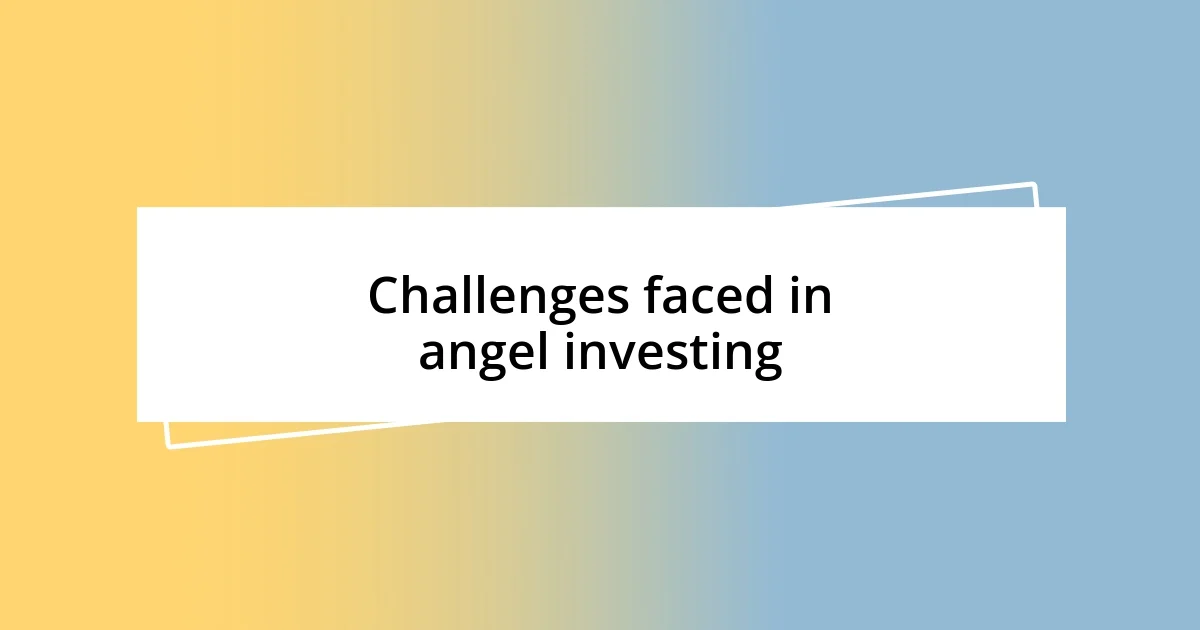
Challenges faced in angel investing
Facing challenges in angel investing is something I’ve come to understand deeply over the years. One of the significant hurdles is the inherent uncertainty surrounding startups. I once invested in a promising health tech company, and while the pitch was stellar, there were moments of doubt when operational issues arose. It can be tough to balance faith in the entrepreneur with the reality of their execution. Have you ever invested your hopes into something only to find roadblocks?
Another challenge that stands out is the lack of control an angel investor has. Unlike in publicly traded companies, my say in how a startup operates is limited. I remember being on a call with a founder who was pivoting the business model in a direction I didn’t fully support. It’s an uneasy feeling to sit back and trust someone else’s vision, especially when your capital is on the line. How do you cope when your instincts say one thing but the founder is convinced of another?
Lastly, the exit strategy can be quite a puzzle as well. There’s always a question lingering in the back of my mind: when and how will I see a return on my investment? I recall my excitement mixed with anxiety while waiting for an acquisition offer from a startup I had believed in. It taught me that patience is vital in angel investing, as the path to possible returns can be long and winding.
| Challenge | Description |
|---|---|
| Uncertainty | Startups often face unpredictable obstacles, creating stress for investors. |
| Lack of Control | Investors may have limited influence on a startup’s direction and decisions. |
| Exit Strategy | Realizing a return on investment can be complex and require extensive patience. |

Evaluating potential startups effectively
Evaluating potential startups effectively requires a delicate mix of analytical thinking and gut feeling. I remember assessing a promising e-commerce platform where the numbers looked solid on paper. But during our discussions, I sensed hesitation in the founder’s voice about their growth strategy. That instinct made me think twice; sometimes, the energy and passion behind a pitch can reveal more than financial projections.
Delving into the team behind the startup is essential as well. I once invested in a company where the founder had a dynamic background, but their team around them lacked experience. As I reflected on my decision, it became clear to me that a strong, cohesive team often makes or breaks a startup’s potential for success. Have you ever seen a great idea fall flat due to a weak team? It’s a cautionary tale worth considering.
Lastly, I find it invaluable to test a startup’s adaptability. A friend of mine invested early in a software company that initially struggled but pivoted brilliantly to address market needs. Their ability to shift focus quickly showed resilience and insight—qualities I greatly admire in entrepreneurs. It made me realize that sometimes, it’s not just about the initial idea, but how an entrepreneur responds to challenges that truly determines their potential for success.
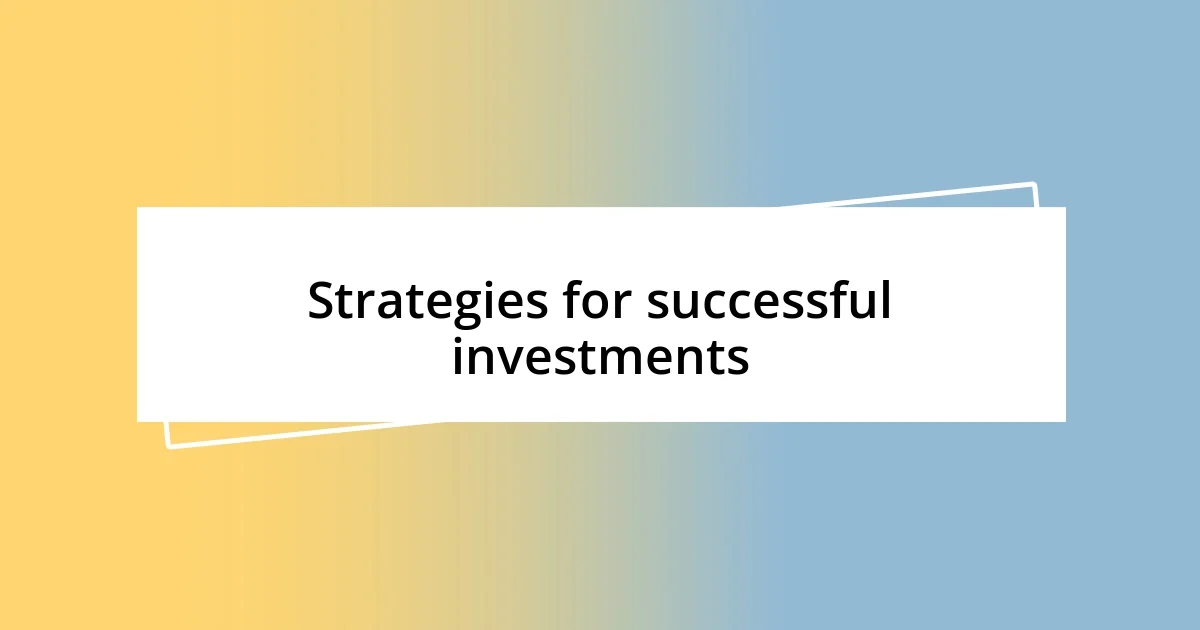
Strategies for successful investments
One strategy that has served me well in angel investing is building a diverse portfolio. I remember attending a conference where a speaker emphasized that investing in different sectors can mitigate risk. This advice struck me because, after diversifying my investments, I found that even when one startup hit a rough patch, others thrived, creating a balance in my overall returns. Have you ever noticed how unexpected opportunities often arise in the least likely places?
Another effective approach is to nurture relationships with founders post-investment. I’ve made it a habit to check in regularly, not just about financials but also about the emotional health of the team. I once lent an ear to a founder feeling overwhelmed, which not only strengthened our rapport but also led to valuable insights about their strategic pivots. Isn’t it amazing how fostering these connections can lead to mutual growth?
Lastly, I always emphasize the importance of continuous learning in this field. Attending workshops and joining angel networks has enriched my understanding immensely. I recall a specific workshop where I learned about the importance of market validation; it completely reshaped how I assess new startups. Engaging with other investors and sharing experiences provides an invaluable perspective—how often do you take time to reflect and learn from others in your field?
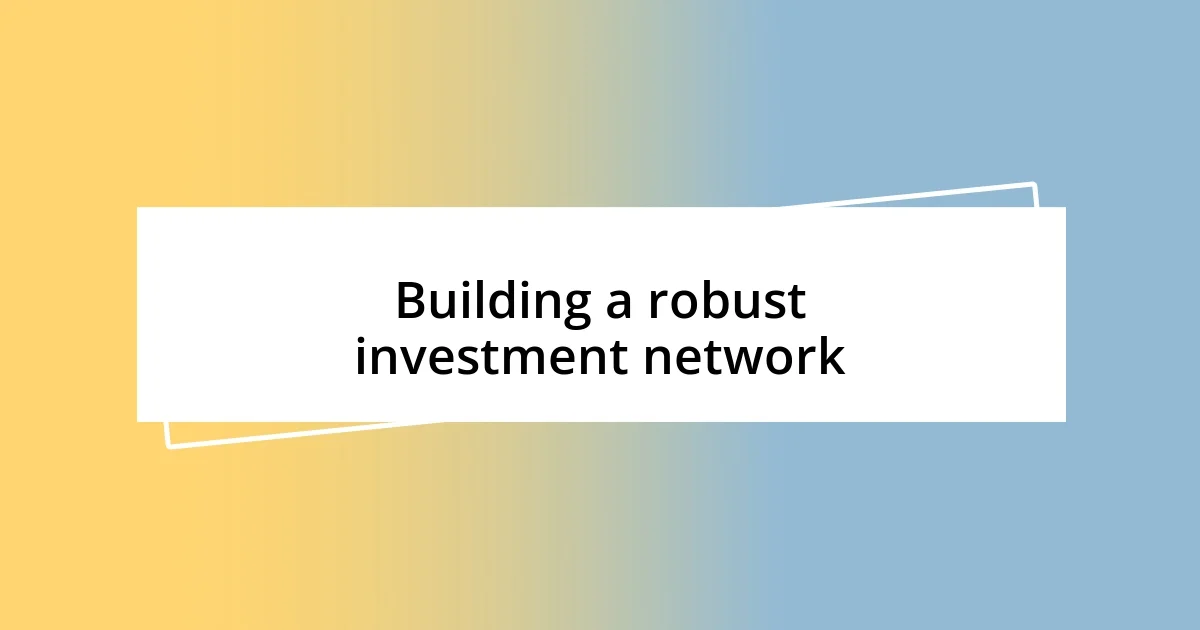
Building a robust investment network
Building a robust investment network goes beyond merely knowing people; it’s about cultivating genuine relationships. I recall a networking event where I connected with an investor who shared insights that changed my approach to evaluating startups. We bonded over our experiences, and our conversations have led to collaborative ventures—like two minds figuring out investment strategies together. Have you ever found that a single connection can open multiple doors in your professional journey?
Nurturing these relationships requires genuine follow-up and staying engaged in the community. I often reach out to fellow investors just to share interesting articles or updates I stumble upon. I remember mentioning a breakthrough in fintech that piqued a colleague’s interest, which eventually sparked a new investment opportunity for us both. It’s fascinating to see how sharing knowledge can foster trust and lead to fruitful partnerships!
Additionally, attending industry events and workshops reinforces the bonds within my network. Every time I step into a room full of like-minded individuals, I feel a sense of camaraderie and shared purpose. At one such event, I met a promising entrepreneur who later became a close ally. The energy in those spaces is invaluable; you never know who might inspire or inform your next move. How often do you invest time in creating these connections? The effort tends to yield unexpected rewards.

Lessons learned from personal experiences
From my journey in angel investing, one lesson that stands out is the importance of patience. I vividly recall a time when I invested in a tech startup that seemingly floundered for months. Many advised me to pull out, but I decided to hold my ground. Eventually, after roughly a year, the company’s strategy shifted significantly, leading to remarkable growth. Have you ever felt tempted to abandon a venture prematurely? Sometimes, just waiting a bit longer can unveil potential that isn’t immediately apparent.
Emotional intelligence has also played a crucial role in my understanding of the startup landscape. In one instance, I supported an entrepreneur whose product was gaining traction, but their enthusiasm was waning due to mounting pressure. Engaging with them on a personal level revealed insights that reshaped how I viewed their business challenges. This experience taught me to look beyond just the numbers—how often do you consider a founder’s mindset when evaluating a potential investment?
Lastly, I’ve learned that failure can be the best teacher. Early in my investing career, I supported a promising biotech startup that ultimately collapsed. Although it was disheartening, the lessons I gleaned about risk management and market needs were invaluable. Reflecting on that experience, I realize that each disappointment has sharpened my instincts. Have you ever turned a setback into a stepping stone for future success? Embracing failures often leads to breakthroughs in understanding and strategy.






